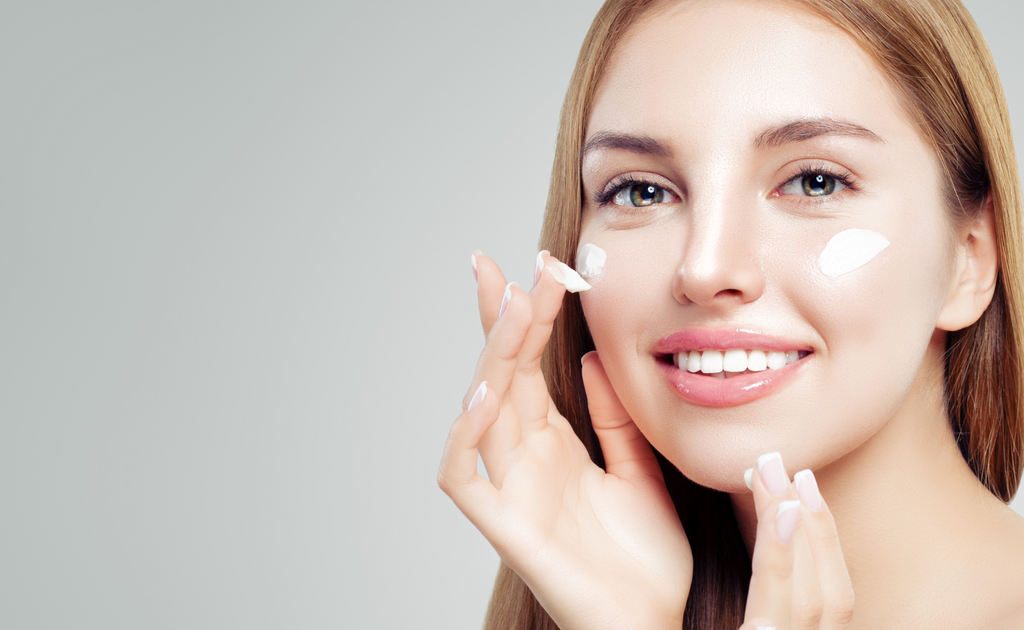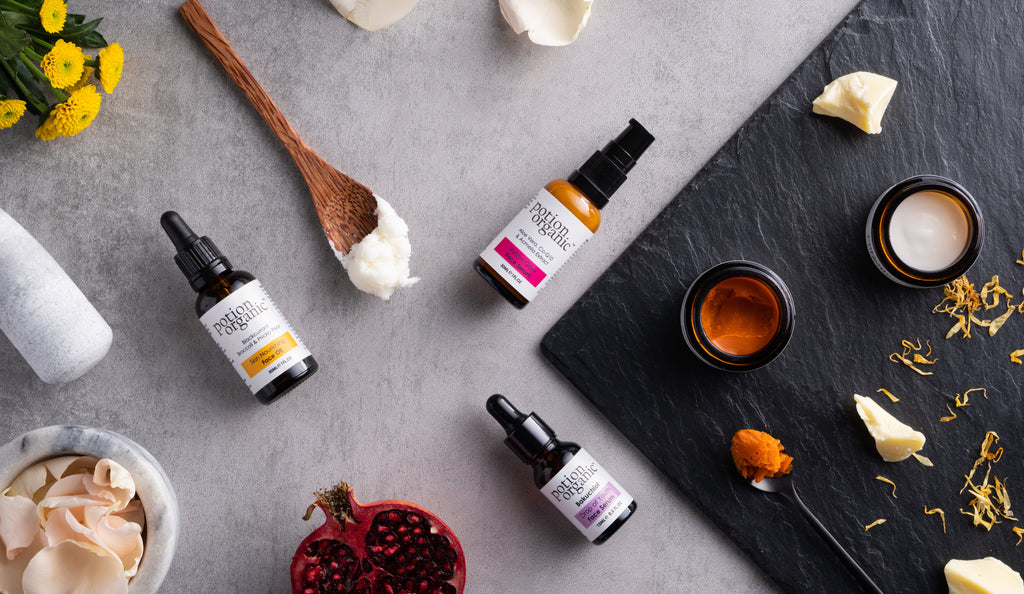Restore Your Skin's Natural Defence: Repairing a Damaged Skin Barrier Naturally
How to Repair a Damaged Skin Barrier and Restore Facial Elasticity
The skin barrier, also known as the stratum corneum, is the outermost layer of our skin that serves as a defensive shield against environmental threats, while simultaneously preventing water loss from the skin's deeper layers.
It plays a pivotal role in maintaining overall skin health and preserving its elasticity and vibrancy. A healthy skin barrier is indicative of a well-hydrated and nourished skin surface, whereas a compromised skin barrier is often characterized by dryness, redness, and increased sensitivity.
Factors that can cause damage to the skin barrier include harsh skincare products, over-exfoliation, environmental pollutants, UV exposure, and lifestyle habits such as poor diet and lack of sleep.

Understanding the Skin Barrier
The skin barrier, scientifically known as the stratum corneum, is the outermost layer of the skin and acts as our body's frontline defence against environmental aggressors. It comprises of tightly packed cells that function like a wall, protecting the underlying skin layers from harmful bacteria, allergens, and other toxic substances.
At the same time, it helps prevent excessive water loss, thereby maintaining skin hydration and preserving its elasticity. An intact and healthy skin barrier is crucial for a radiant and youthful complexion. It aids in skin cell regeneration, promotes even skin tone, and reduces signs of aging like fine lines and wrinkles.
Therefore, preserving the integrity of the skin barrier is essential for maintaining overall skin health and vitality.
Factors Contributing to Skin Barrier Damage
Various external and internal factors can contribute to skin barrier damage, resulting in an array of skin issues.
- Harsh skincare products: Products containing harsh chemicals, detergents, or fragrances can strip the skin of its natural oils, disrupting the skin's pH balance, and ultimately damaging the skin barrier.
- Over-exfoliation: Although exfoliation helps in removing dead skin cells and promoting skin renewal, excessive or incorrect exfoliation can weaken the skin barrier, leading to increased skin sensitivity and dryness.
- Environmental pollutants: Exposure to pollutants and toxins present in the environment can lead to oxidative stress and inflammation, significantly damaging the skin barrier.
- UV exposure: Prolonged exposure to the sun's harmful ultraviolet rays can cause photoaging, leading to the breakdown of collagen and elastin fibres that support the skin barrier.
- Lifestyle habits: Poor nutrition, lack of sleep, chronic stress, and smoking can impair the skin's repair process, leading to premature skin aging and a compromised skin barrier.
Understanding these factors is the first step towards protecting and repairing your skin barrier. In the following sections, we'll discuss how to restore a damaged skin barrier and restore facial elasticity.

Signs of a compromised skin barrier
Recognizing signs of a compromised skin barrier is crucial in taking timely action to repair and rejuvenate your skin. Here are some common symptoms that might indicate damage to your skin barrier:
- Dryness and Dehydration: When the skin barrier is damaged, it loses its ability to retain moisture, leading to dry, dehydrated skin. If your skin feels tight and dry despite using moisturizers, it might be a sign that your skin barrier needs attention.
- Increased Sensitivity: A weakened skin barrier can make your skin more reactive to skincare products or environmental factors. If you experience redness, itching, or burning sensations after applying skincare products, it might indicate skin barrier damage.
- Rough Texture and Dullness: The skin can lose its smooth texture and appear dull and lifeless when the skin barrier is compromised. It might also lead to the appearance of open, enlarged pores.
- Breakouts and Inflammation: A damaged skin barrier can lead to an imbalance in the skin's microbiome, causing issues like acne, inflammation, and increased susceptibility to infections.
- Visible Signs of Aging: A compromised skin barrier can accelerate the aging process, leading to the premature appearance of fine lines, wrinkles, and loss of elasticity.
If you notice any of these signs, it's time to reassess your skincare routine and integrate strategies to repair your skin barrier. 
Skin Types More Prone to Damaged Skin Barrier
Certain skin types are more susceptible to damage and disruption of the skin barrier.
- Dry Skin: Dry skin lacks adequate moisture, leading to a compromised skin barrier. This skin type is more prone to flakiness, itching, and tightness, which indicates a damaged skin barrier that struggles to retain moisture.
- Sensitive Skin: Sensitive skin is highly reactive and prone to redness, burning, and stinging sensations, increasing its vulnerability to skin barrier damage. These individuals need to be extra cautious about the products they use.
- Mature Skin: As we age, the skin's ability to regenerate and repair itself decreases, leading to a weakened skin barrier. Mature skin is more prone to dryness, fine lines, and wrinkles, all signs of a damaged skin barrier.
- Overworked Skin: Skin that is constantly subjected to harsh skincare routines, including over-exfoliation and overuse of active ingredients like retinoids and acids, can end up with a damaged skin barrier.
Understanding your skin type is crucial in order to protect and maintain your skin barrier effectively. Tailoring your skincare routine to your specific skin type can help preserve the integrity of your skin barrier and promote healthier, more resilient skin.
Steps to Repairing a Damaged Skin Barrier
- Gentle Cleansing: Importance of using a gentle cleanser.
- Hydration: Tips for keeping the skin hydrated.
- Moisturizing: The role of moisturizers in repairing the skin barrier.
- Serums and Treatments: How certain serums and treatments can assist in repair.
- Avoiding Harmful Products: Harmful skincare products to avoid that can damage the skin barrier.

Restoring Facial Elasticity
Facial elasticity refers to the skin's ability to stretch and return to its original shape and form. It is a key characteristic of youthful, healthy skin and is primarily maintained by two vital proteins: collagen and elastin.
Collagen grants strength and firmness to the skin, whereas elastin provides flexibility and resilience, allowing the skin to bounce back after being stretched or contracted.
Several factors contribute to the decrease in facial elasticity over time:
- Aging: As we age, our skin naturally produces less collagen and elastin, leading to a loss of skin elasticity. This is a primary reason for the appearance of wrinkles, fine lines, and sagging skin.
- Sun damage: Chronic exposure to the sun's ultraviolet (UV) rays can accelerate the breakdown of collagen and elastin, leading to premature skin aging and reduced skin elasticity.
- Lifestyle factors: Smoking, poor diet, and lack of sleep can also compromise the production of collagen and elastin, and hence, lead to a loss of skin elasticity.
- Environmental pollutants: Exposure to toxins and pollutants can cause oxidative stress, which can damage the collagen and elastin fibres in the skin, leading to decreased elasticity.
Understanding these factors is crucial for devising strategies to restore and maintain skin's elasticity, which we will discuss in the following sections.
- Steps and products that can help restore elasticity.
- Lifestyle changes to help improve skin elasticity.

Importance of Nutrition in Repairing the Skin's Barrier and Regaining Elasticity
Proper nutrition plays a pivotal role in skin health. It provides the necessary vitamins, minerals, and antioxidants that help repair the skin barrier and boost skin elasticity.
- Healthy Fats: Foods rich in Omega-3 and Omega-6 fatty acids such as fish, nuts, and avocados, enhance the skin's ability to retain moisture and strengthen the skin's barrier function.
- Vitamin C: This powerful antioxidant found in citrus fruits, bell peppers, and strawberries, aids in collagen production, thereby enhancing skin elasticity and reducing signs of aging.
- Vitamin A: Foods such as carrots, sweet potatoes, and spinach are rich in Vitamin A, which promotes skin cell turnover and helps maintain a strong skin barrier.
- Vitamin E: Found in nuts, seeds, and leafy greens, Vitamin E protects the skin from oxidative damage and aids in skin repair.
- Zinc: Essential for wound healing and combating inflammation, zinc can be found in foods like oysters, lentils, and beef.
- Hydration: Adequate water intake is crucial for maintaining the skin's moisture balance and facilitating the delivery of nutrients to the skin cells.
Incorporating these nutrients into your diet can significantly improve skin health, restore the skin barrier, and enhance skin elasticity. However, it's essential to remember that nutrition is just one piece of the puzzle and should be complemented with a comprehensive skincare routine and healthy lifestyle habits.

Skincare Products for Repairing Skin's Barrier
Various skincare products can be instrumental in repairing the skin's barrier. These include:
- Ceramide-Based Moisturizers: Ceramides are lipids naturally present in the skin that play a vital role in maintaining the skin's barrier and retaining moisture. Moisturizers enriched with ceramides can help replenish this crucial lipid, strengthening the skin barrier and preventing moisture loss.
- Hyaluronic Acid Serums: Hyaluronic acid is a potent humectant that can hold up to 1000 times its weight in water. Serums containing hyaluronic acid can deeply hydrate the skin, assisting in skin barrier repair by boosting skin moisture levels.
- Niacinamide Treatments: Niacinamide, or vitamin B3, has been shown to strengthen the skin's barrier and improve skin texture. It also has anti-inflammatory properties which can soothe irritated skin.
- Antioxidant-Rich Creams: Antioxidants like vitamins C and E, ferulic acid, and green tea extract can protect the skin from environmental damage and assist in skin repair.
- Peptide-Infused Products: Peptides are short chains of amino acids that function as the building blocks of proteins like collagen and elastin in the skin. Using peptide-infused skincare products can stimulate the production of these proteins, thereby improving skin elasticity and reducing signs of aging.
- Retinoid-Based Treatments: Retinoids, derivatives of vitamin A, are renowned for their ability to accelerate skin cell turnover. This promotes a healthier skin barrier and increases collagen production, which can reduce wrinkles and improve skin texture.
- Growth Factor Serums: Growth factors are naturally occurring proteins that regulate cellular growth and healing. Skincare products containing growth factors can boost the skin's repair process, reinforcing the skin barrier, and enhancing overall skin health. They also stimulate collagen and elastin production, improving skin elasticity and firmness.
- Collagen-Boosting Products: Incorporating collagen-boosting products into your skincare routine can significantly enhance skin elasticity. Here are some products that are known for their collagen-stimulating properties:
- SPF Products: Sunscreen is critical to protecting the skin from UV damage which can further compromise the skin barrier. Using a broad-spectrum sunscreen with an SPF of 30 or higher is recommended.
Remember, it's always essential to patch-test new skincare products to ensure they don't cause irritation. Also, be patient as skin barrier repair can take time. Consistency in using these products is key to seeing improvements.
Keys to maintaining healthy skin barrier
Skin barrier healthy and elastic. However, with a few simple lifestyle changes, it is possible to improve skin elasticity and maintain a strong skin barrier.
Appropriate skin care can contribute to improved skin conditions, skin barrier health and skin healthy skin overall.
Harsh cleansers and damage skin barrier function, to built resistant and robust skin barrier is to ensure you are providing your body with a right nutrition support from healthy diet.
Essential oils and other natural ingredients can also be beneficial in promoting skin elasticity and strengthening the skin barrier. It is always important to do research and patch-test before incorporating any new products into your skincare routine.
Regular exercise, stress management techniques, and getting enough sleep also play a crucial role in maintaining healthy skin. Consultation with a dermatologist can provide personalized advice on how to repair and maintain
Ingredients that help with skin barrier restoration are Ceramides, Free Fatty Acids, natural moisturising factors of the skin.
Potion Organic's moisturizers are specially formulated to rejuvenate and strengthen your skin's protective barrier.
Our Blue Marine cream is designed to deeply moisturize and protect the skin from external stressors. The anti-aging effects of our natural ingredients like Irish moss extract, marine algae, and hyaluronic acid help reduce fine lines and wrinkles while promoting firmness and elasticity.
For those with oily or combination skin types, our Organic Oily Serum with Bakuchiol can be used as a lightweight moisturizer to balance and nourish the skin without leaving a greasy residue. The added benefits of pomegranate extract and bakuchiol help protect against environmental damage and provide anti-aging effects.
And for intense hydration and nourishment, our Skin Nourishing Organic Face Oil is the perfect choice. This blend of premium organic oils creates a protective barrier against environmental stressors while providing essential vitamins and fatty acids to promote younger-looking skin.
Instant Glow Serum is also a great option for moisturizing as it provides deep hydration and nourishment with natural ingredients like Q10, Acmella Oleracea extract, and orange blossom flower water. Plus, its lightweight formula won't clog pores or irritate sensitive skin.
No matter what your skin type may be, Potion Organic has a range of moisturizers to help restore and rejuvenate your skin's barrier, leaving you with a healthy and radiant complexion. Try our products today and experience the benefits of natural skincare for yourself!


